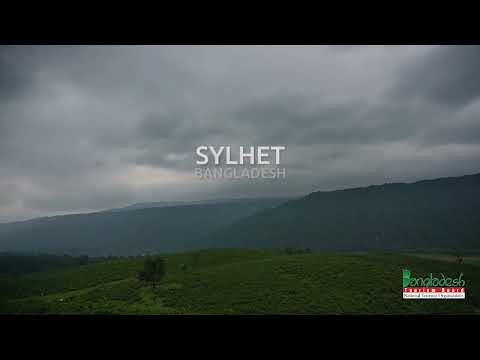Exploring The Enchanting Sylhet Tea Gardens: A Scenic Delight In Bangladesh
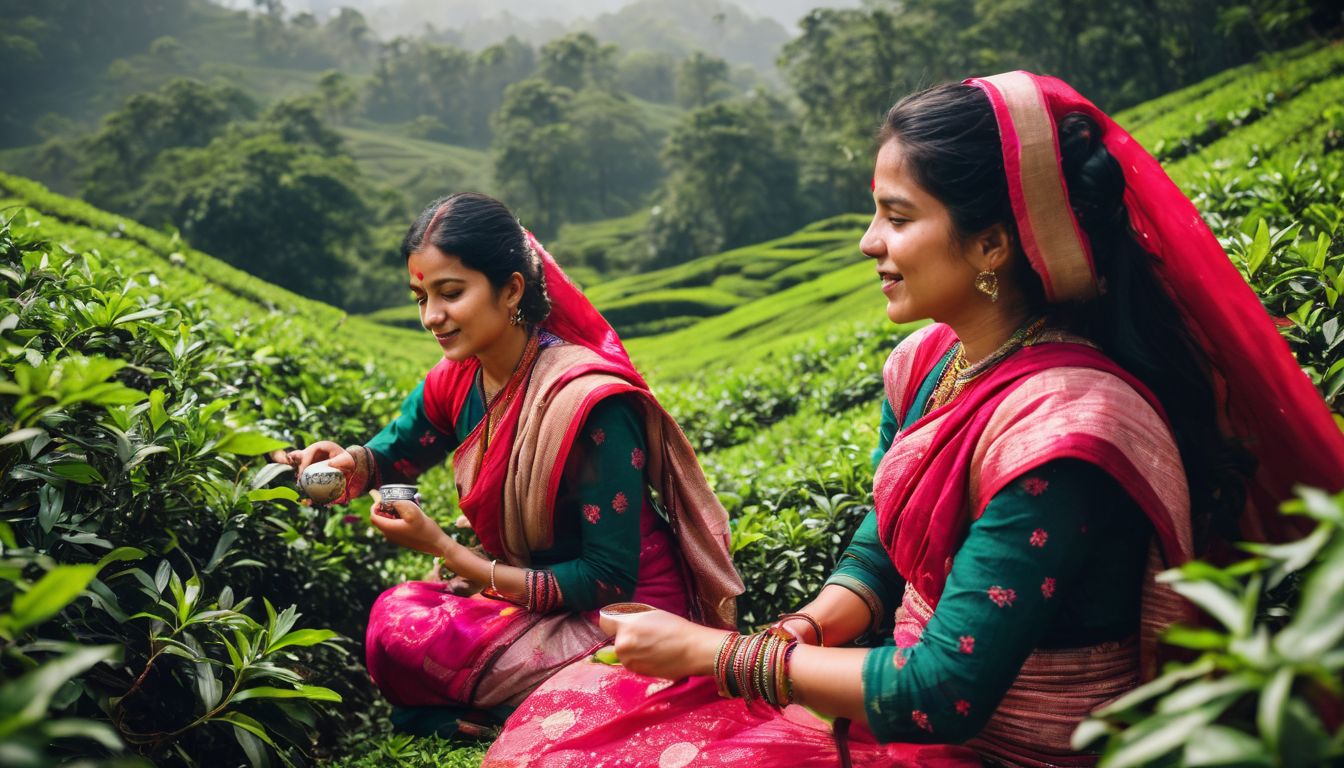
Looking for a serene escape in the heart of nature? Enter Sylhet, an enchanting region in Northeast Bangladesh, known for its picturesque tea gardens. This blog will whisk you away on a virtual journey around these lush green landscapes, offering insights into their history, beauty and cultural significance.
Get ready to see why these heavenly tea gardens are so much more than just scenic delights!
Key Takeaways
- Sylhet Tea Gardens in Bangladesh are known for their lush green surroundings and picturesque views, making them a scenic delight for nature lovers.
- The tea gardens, such as Malnicherra and Lakkatura Tea Estates, offer breathtaking landscapes with their vast size and natural beauty.
- These tea gardens play a significant role in the economy of Bangladesh by providing income and employment opportunities. They also attract tourists from around the world, benefiting the country’s economy.
- Visitors can explore the tea gardens, learn about the tea – making process through guided tours, sample different types of teas, and enjoy the serene atmosphere of these enchanting landscapes.
Overview of Sylhet Tea Gardens

Sylhet Tea Gardens, such as the Malnicherra and Lakkatura Tea Estates, offer a breathtaking experience with their lush green surroundings and picturesque views.
Malnicherra Tea Estate
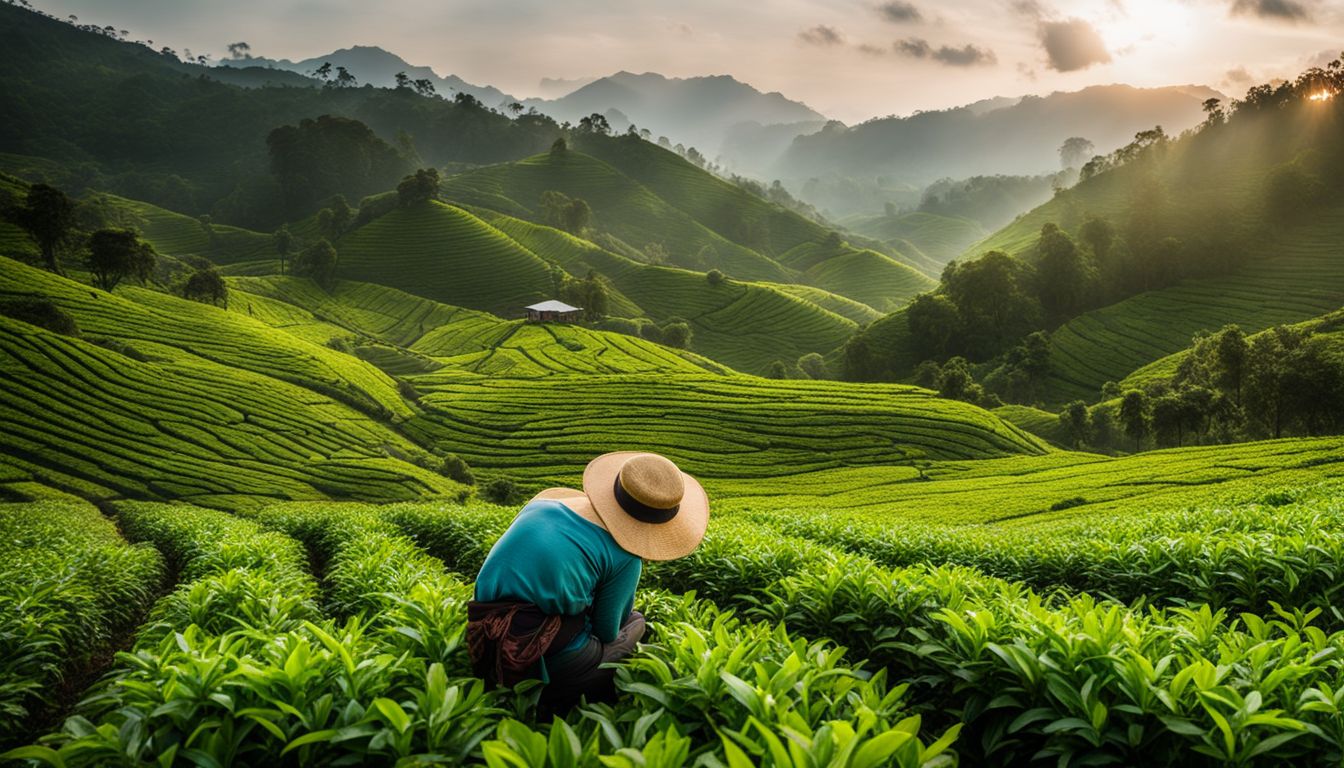
Malnicherra Tea Estate holds a special spot in history. It’s the oldest tea garden not just in Bangladesh, but also in all of Asia. Lord Hudson built it on 1500 acres back in 1849.
Today, it sits near Sylhet International Airport. Thick with old tea plants, this area is both a tea source and a loved place for visitors to come see. Its rich past makes it stand out as the first commercial tea garden in Bangladesh too!
Lakkatura Tea Garden
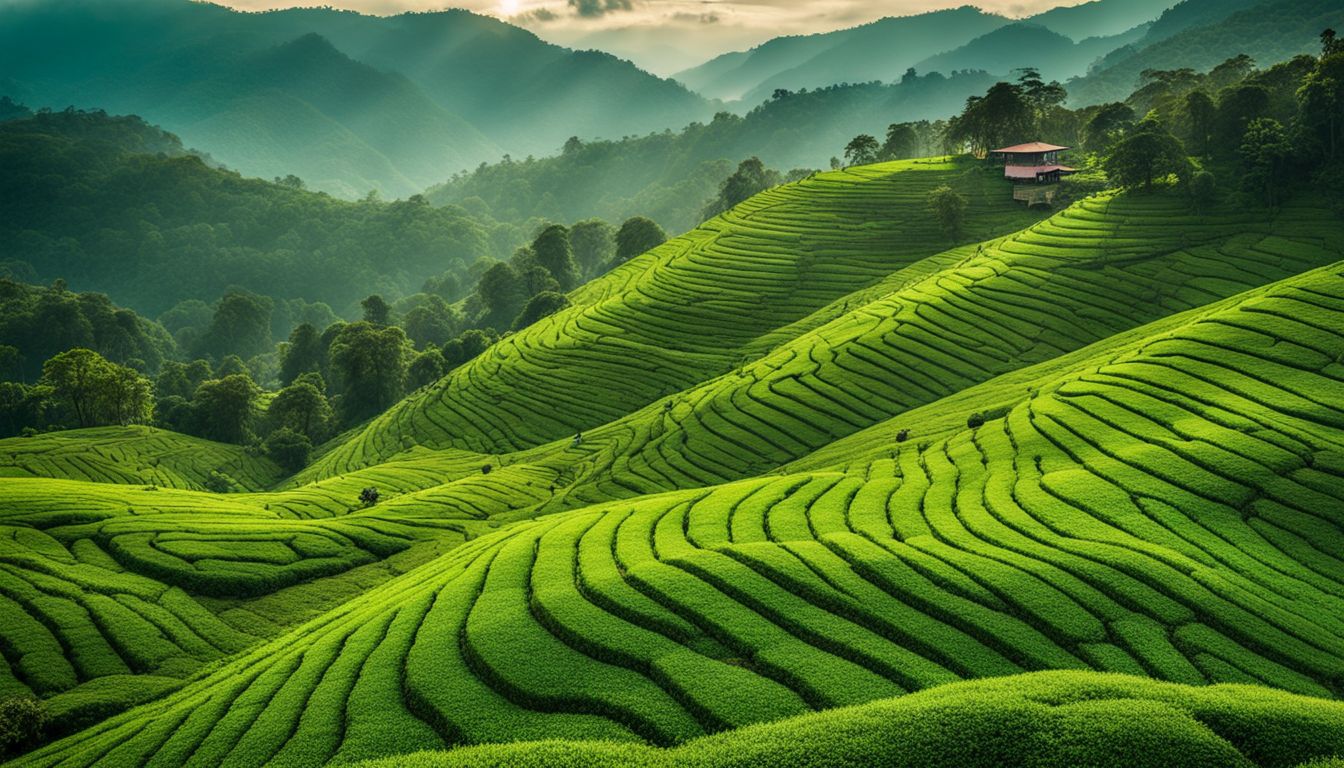
Lakkatura Tea Garden is a sight you can’t miss in Bangladesh. It’s big, one of the largest tea gardens in the country. This garden covers about 3200 acres of land. The National Tea Board controls it, so it has top-notch care.
The garden is full of green plants that are lovely to see. People visiting Sylhet’s tea gardens always put Lakkatura on their list. It stands out with its natural beauty and vast size.
You will love exploring this unique place.
Malnichhera Tea Garden
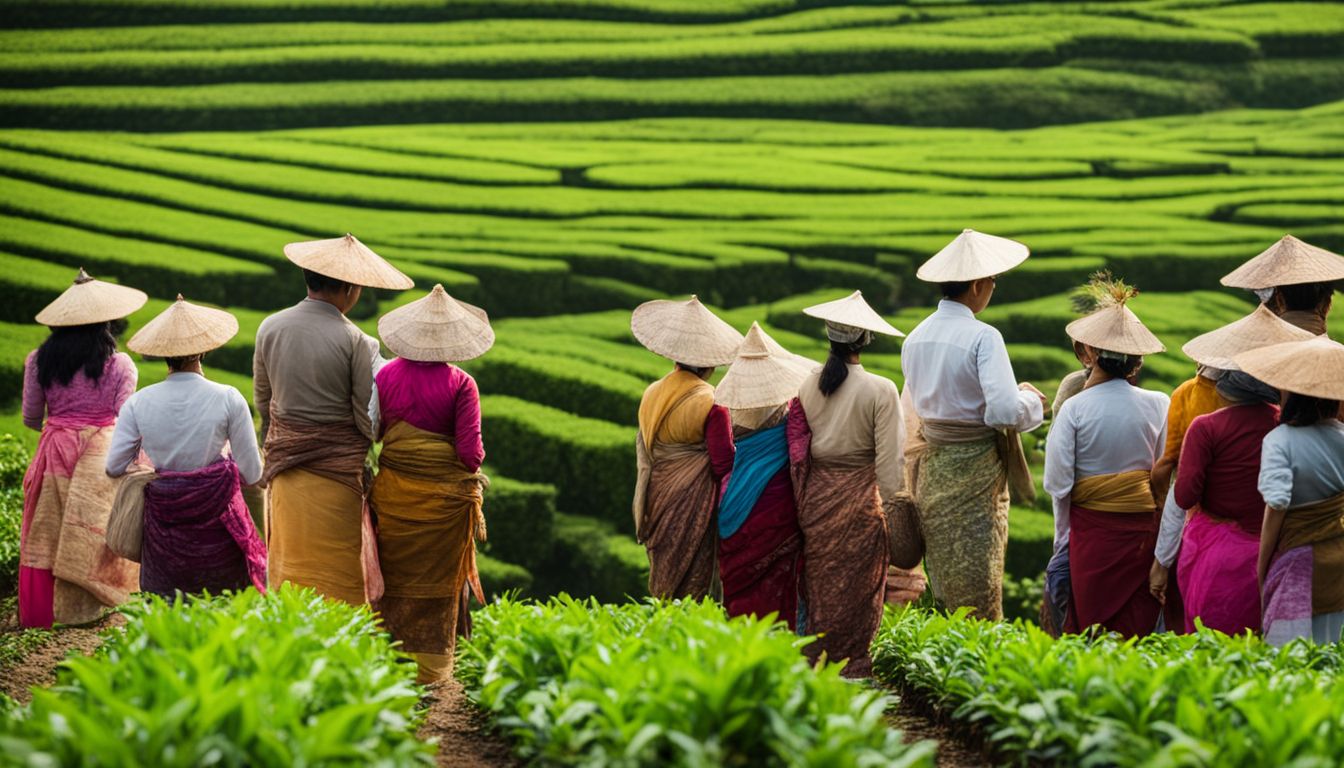
Malnichhera Tea Garden sits in Sylhet Sadar Upazila. It is the oldest and biggest tea garden in both Bangladesh and the subcontinent. This tea garden started its journey back in 1854.
Today, it continues to charm visitors with its old-world charm and lush green beauty. Coming here feels like stepping into a dream with rows of neatly trimmed tea plants as far as the eye can see.
Visit Nearby Tea Gardens in Sylhet City

There are several nearby tea gardens in Sylhet City that you can visit during your trip. These include:
- Malnicherra Tea Estate
- Lakkatura Tea Garden
- Malnichhera Tea Garden
History of Tea Gardens in Bangladesh
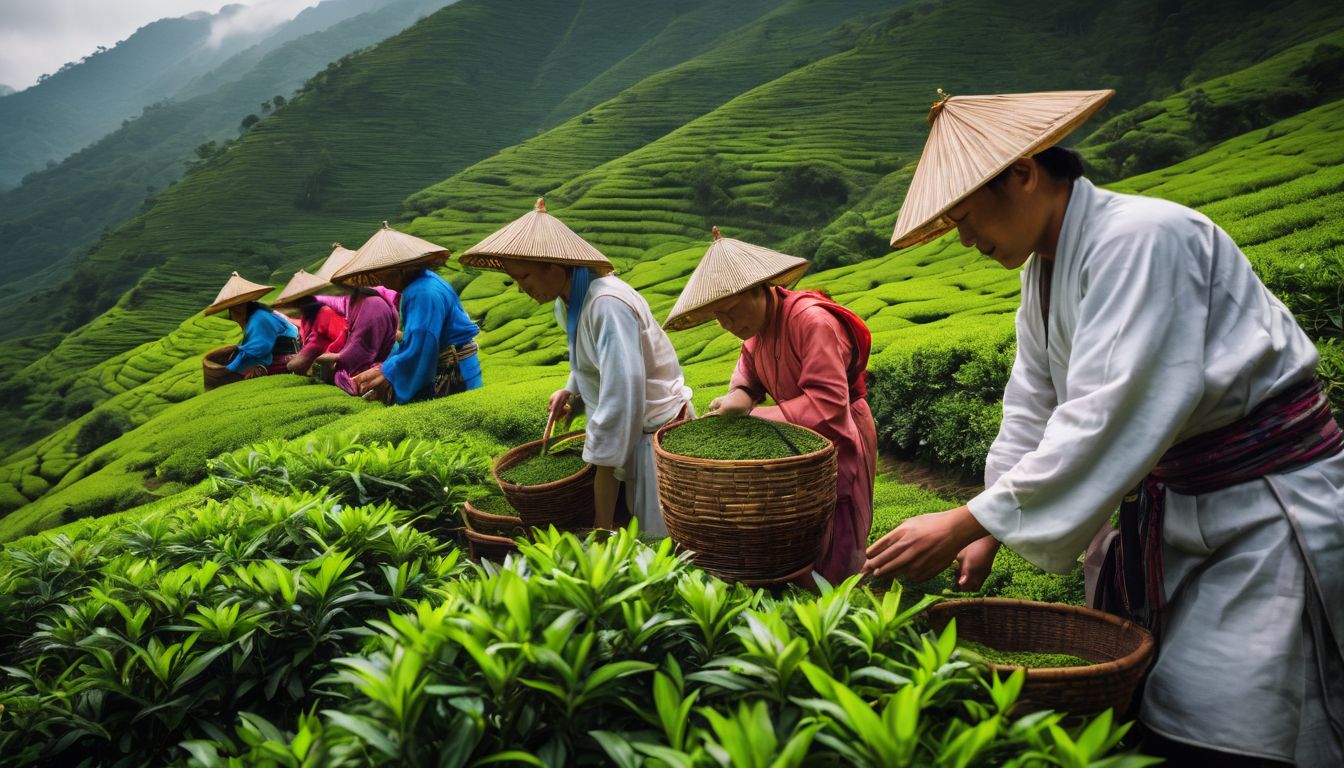
Tea gardens in Bangladesh have a rich history, with the first and largest tea garden in the subcontinent located in Sylhet. Discover how these gardens played a significant role in the country’s economy and why they are worth exploring.
Read More.
The First and Largest Tea Garden in the Subcontinent
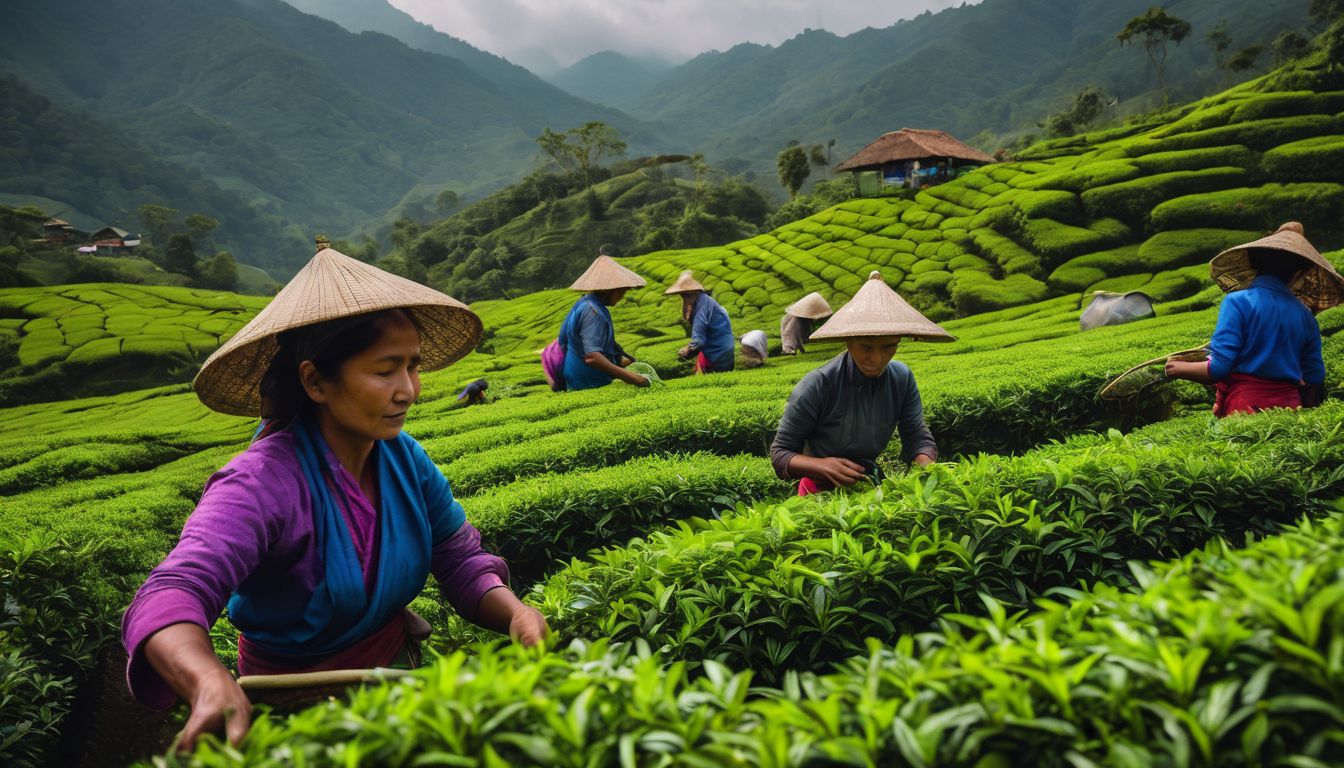
The first and largest tea garden in the subcontinent is Lakkatura Tea Garden, located in Sylhet, Bangladesh. It covers an impressive 3,200 acres of land and has been around since 1875, making it one of the oldest tea gardens in the region.
Sylhet itself is known for its stunning Surma Valley, which is adorned with terraces of tea gardens and vibrant tropical forests. The Malanichara Tea Garden, also found in Sylhet, holds another remarkable title as the first ever established tea garden in the subcontinent.
This beautiful estate spans approximately 1500 acres and stands as a testament to the rich history of tea production in Bangladesh and beyond.
Role of Tea Gardens in Bangladesh’s Economy
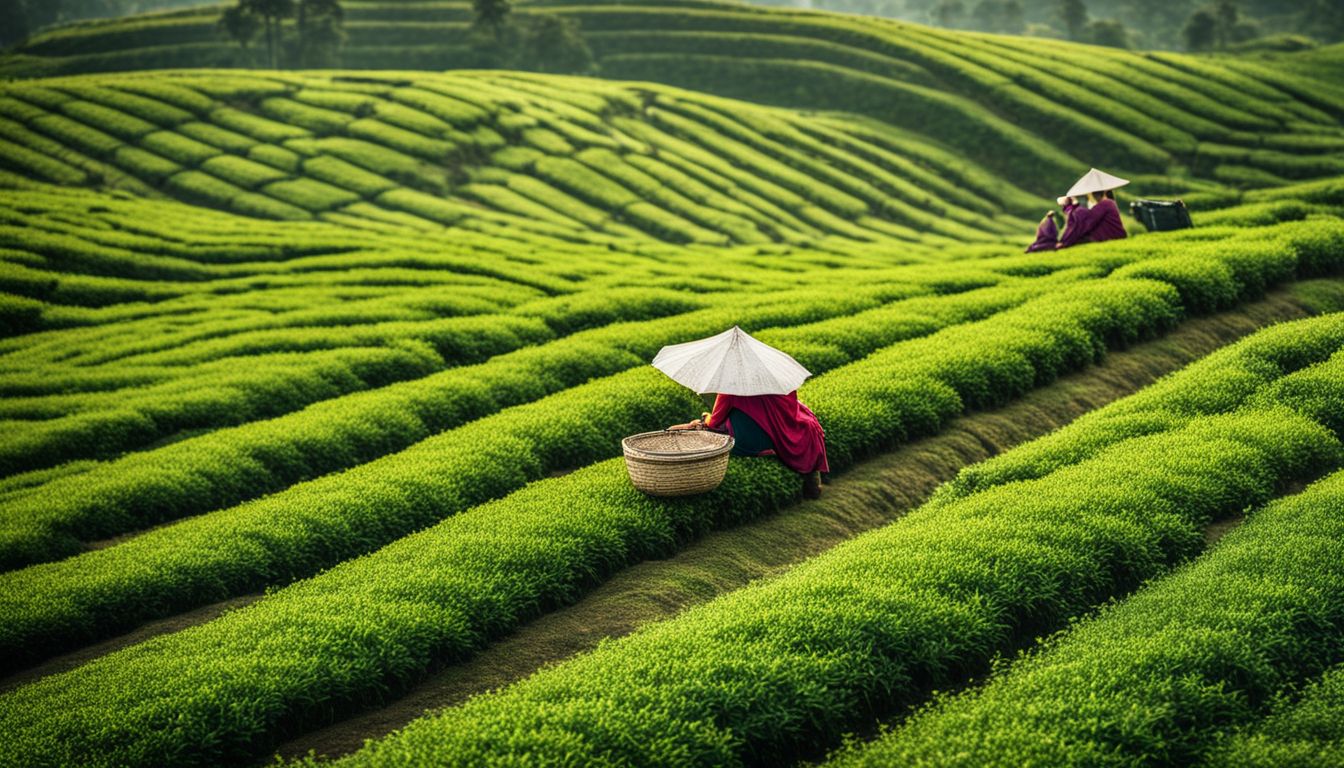
The tea gardens in Sylhet, Bangladesh, play a big role in the country’s economy. They are an important source of income and employment for many people. In fact, Bangladesh is the 12th largest tea producer in the world.
The tea industry dates back to British rule and has been contributing to the economy ever since. A study investigating the socio-economic conditions of tea garden workers in Sylhet highlighted how crucial this industry is for the country’s economic growth.
Additionally, these beautiful tea gardens also attract tourists from around the world, further benefiting the economy of Bangladesh.
The Beauty of Sylhet Tea Gardens

Immerse yourself in the lush green surroundings, picturesque views, and unique hillside location of Sylhet Tea Gardens – a scenic delight that will take your breath away.
Lush Green Surroundings
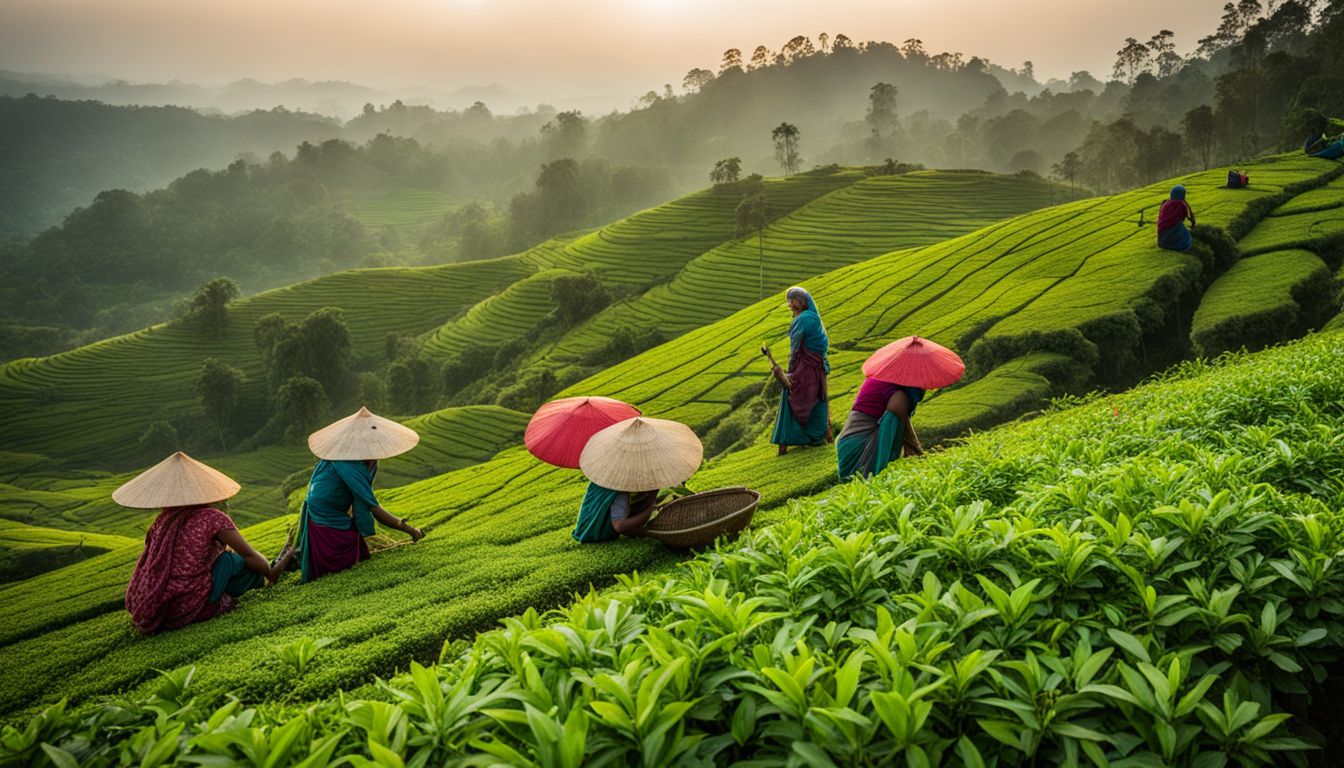
Sylhet’s tea gardens are a feast for the eyes, with their lush green surroundings. The rolling hills of Sylhet are covered in vibrant tea plants, creating a picturesque environment that attracts visitors from far and wide.
These tea gardens provide a tranquil oasis, where you can immerse yourself in the beauty of nature. As you walk through the gardens, you will be captivated by the serene landscapes and the soothing sounds of nature.
It’s no wonder that Sylhet is famous for its lush green hills and beautiful tea gardens. Whether you’re a nature lover or simply looking for some peace and tranquility, Sylhet’s tea gardens will not disappoint.
Picturesque Views
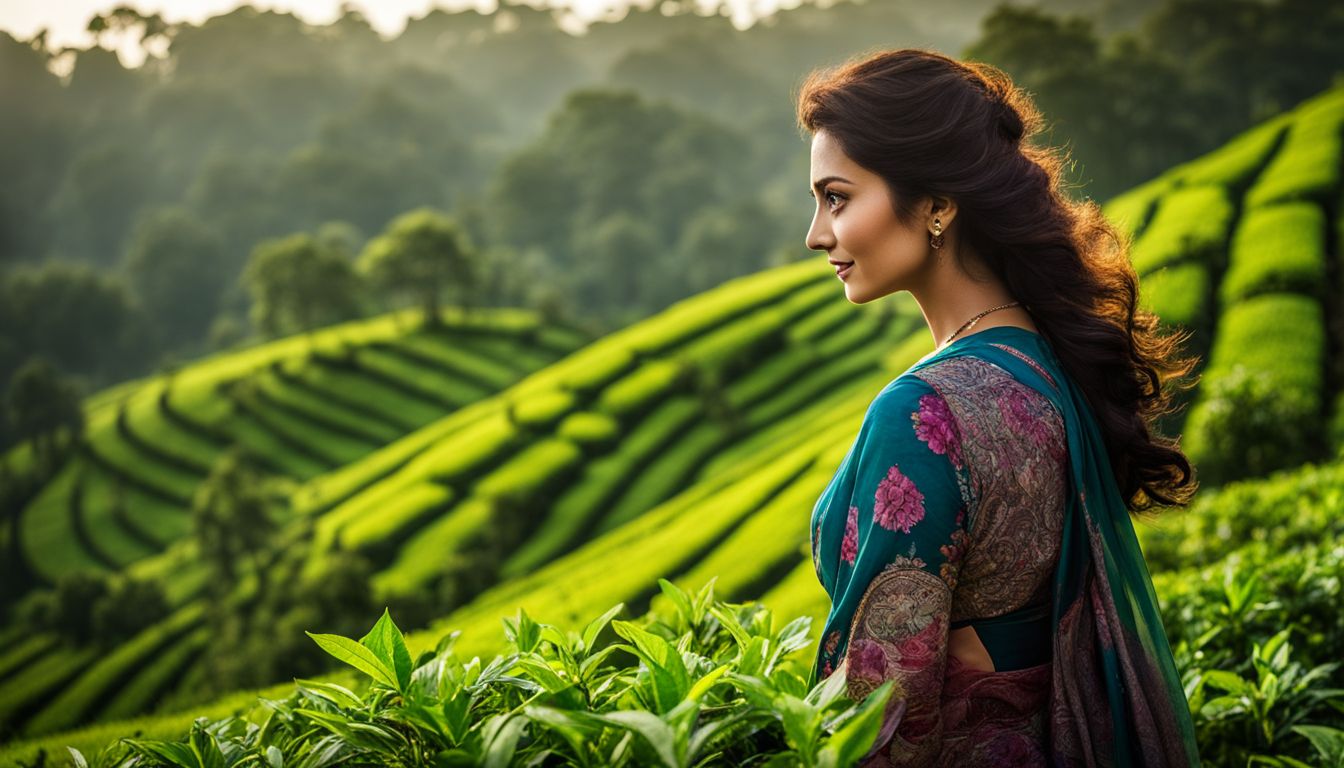
The Sylhet tea gardens offer breathtaking picturesque views that will leave you in awe. As you explore these enchanting landscapes, you’ll be greeted by lush green hills and stunning tea plantations stretching as far as the eye can see.
The serene beauty of the Surma Valley in Sylhet, with its tea gardens nestled amidst rolling hills and verdant forests, creates a truly mesmerizing sight. Whether you’re strolling through the Malnicherra Tea Estate or admiring the beauty of Lakkatura Tea Garden, every corner of Sylhet’s tea gardens promises captivating vistas that are perfect for immersing yourself in nature’s tranquility.
Soak in the peaceful atmosphere and indulge your senses with these picturesque views that will make your visit to Sylhet unforgettable.
Unique Hillside Location
The Sylhet tea gardens are famous for their unique hillside location. Spread across sloping hills, these gardens offer stunning views and a one-of-a-kind experience. One particularly extraordinary garden is Lakkatura, known for its breathtaking beauty.
The hills provide a natural backdrop to the lush green tea bushes, creating a picturesque setting that is unlike anything else. As you explore the tea gardens, you’ll be captivated by the mesmerizing scenery and the peaceful ambiance of this enchanting region.
Tea Tasting and Touring
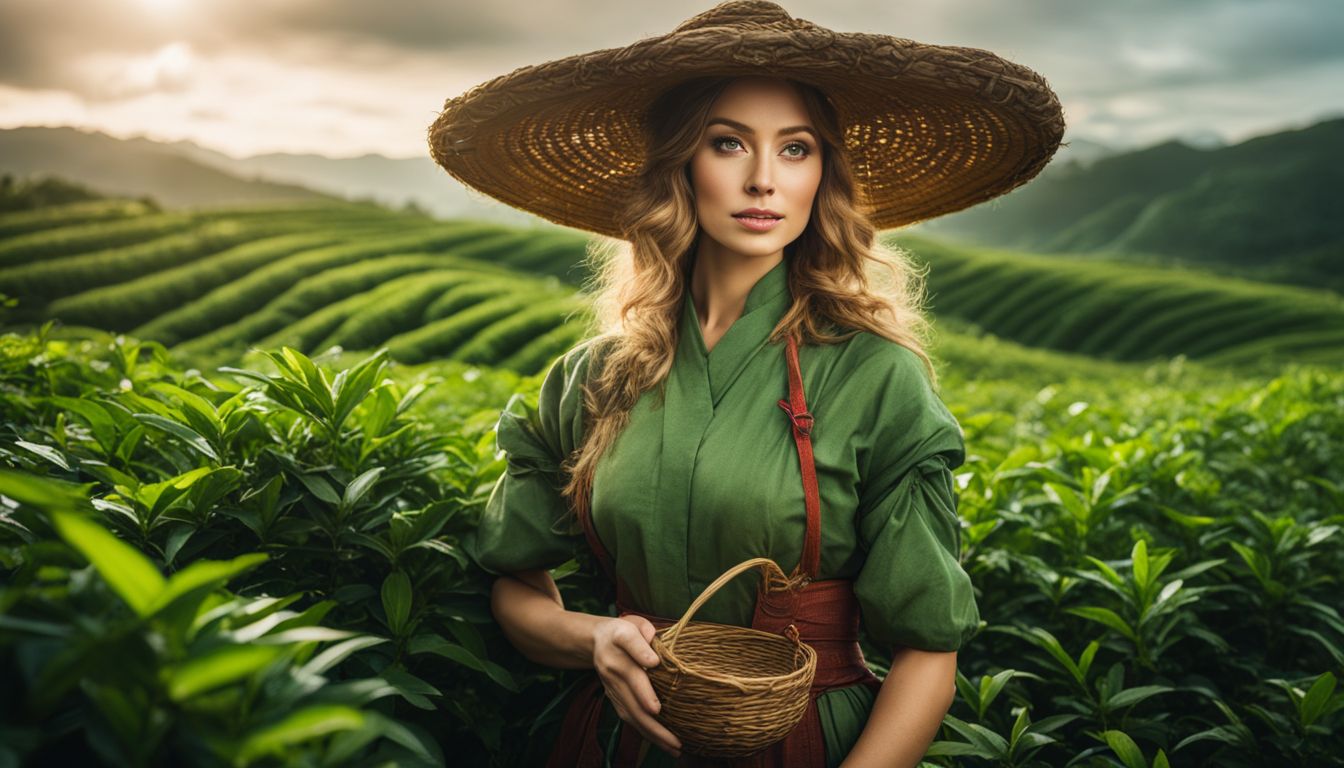
Experience the fascinating process of tea making and indulge in different types of teas through guided tours and interactive tasting sessions at the Sylhet Tea Gardens.
Learning About the Tea Making Process
Tea production in Sylhet is an interesting process to learn about. During a guided tour of the tea gardens, you’ll get to see how tea leaves are plucked from the plants. These tender leaves then go through various stages of processing, such as withering, rolling, fermenting, and drying.
The final result is the tea that we enjoy in our cups. It’s fascinating to witness this transformation firsthand and understand the efforts involved in creating our favorite beverage.
Plus, you can even participate in tea tasting sessions to sample different types of teas and appreciate their unique flavors.
Sampling Different Types of Teas
In Sylhet’s tea gardens, you’ll have the chance to sample a variety of teas. As you learn about the tea making process, you can also taste different types of teas and discover their unique flavors.
From black and green teas to herbal infusions, there’s something for every tea lover to enjoy. Whether it’s a bold and robust Assam tea or a delicate white tea, each cup will transport your taste buds on a delightful journey.
So take your time savoring these aromatic brews and experience the true essence of Sylhet’s tea culture.
Nearby Attractions and Activities
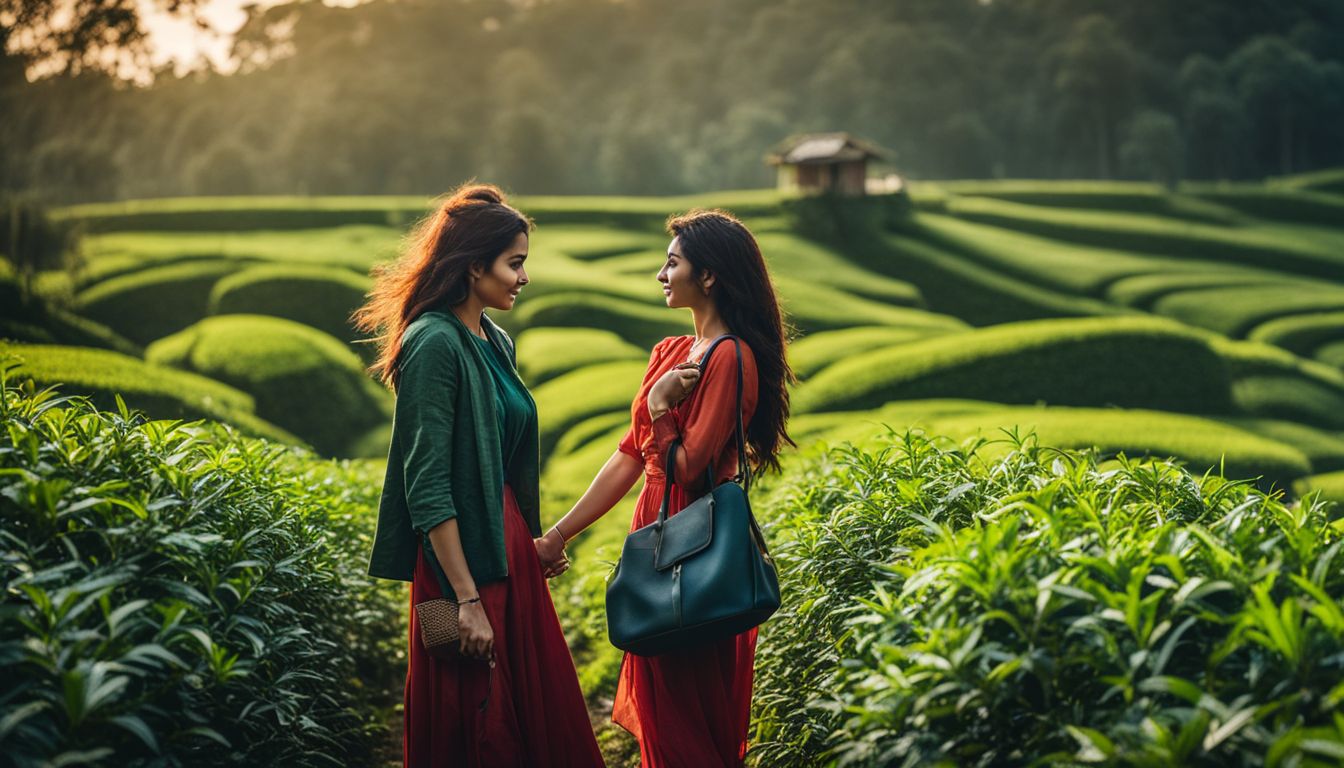
Discover the fascinating Jatinga Bird Deaths phenomenon, explore Nemo’s Garden, and visit Mission Garden and Monticello’s Vegetable Garden and Fruitery in Sylhet while enjoying the enchanting tea gardens.
Jatinga Bird Deaths
Jatinga, a small village located in Assam, India, is famous for the mysterious bird deaths that occur every September. These bird deaths have attracted worldwide attention and earned Jatinga the nickname “bird’s suicide site.” It is fascinating yet perplexing to witness flocks of birds descending on the village during dark nights and meeting their untimely demise.
Despite extensive research, scientists are still trying to understand why this phenomenon happens specifically in Jatinga. The abundance of foggy weather conditions and strong winds are believed to disorient the birds, causing them to fly into buildings or plummet to the ground.
This strange occurrence continues to captivate visitors who come from far and wide to witness these eerie events firsthand.
Nemo’s Garden
Nemo’s Garden is one of the attractions you can explore while visiting the enchanting Sylhet tea gardens in Bangladesh. Located nearby, Nemo’s Garden offers a unique experience where you can witness an innovative underwater farming project.
The garden utilizes transparent biospheres to grow plants underwater, creating an intriguing sight for visitors. It’s an interesting blend of nature and technology that showcases sustainable practices and highlights the beauty of the region.
Mission Garden
Monticello’s Vegetable Garden and Fruitery
Monticello’s Vegetable Garden and Fruitery is a thriving farm located on a 650-acre property near the mansion. It features the South Orchard, which boasts 400 trees and two small vineyards.
This incredible space serves not only as a source of fresh produce but also as a living seedbank, preserving heirloom seeds and grafting techniques. Thomas Jefferson viewed his gardens as both a botanical showcase and an experimental laboratory for plants.
The dedicated gardening team at Monticello even saves and sells excess heritage seeds in their gift shop. With its exotic trees planted by Jefferson himself, the Fruitery at Monticello is truly a fascinating must-visit destination for garden enthusiasts.
Gorreana Tea Plantation
Gorreana Tea Plantation is Europe’s oldest tea farm that is still running. Located in São Miguel, Portugal, it offers breathtaking views and a delightful experience for visitors. The Gorreana Tea Factory, which is also the oldest tea factory in Europe that is still in operation, can be found within the plantation.
Many people enjoy hiking through the beautiful tea fields of Gorreana, immersing themselves in the stunning landscape of rolling hills covered with tea plants.
Plan Your Trip

To plan your trip to the enchanting Sylhet Tea Gardens, consider the best time to visit, transportation options, and accommodations that suit your preferences.
Best Time to Visit
The best time to visit the Sylhet Tea Gardens is during the rainy season. This is when the gardens are at their most vibrant and lush, with the tea plants flourishing in the moist climate.
The rainy season in Sylhet typically occurs from June to September, so planning your trip during this time will allow you to experience the tea gardens in all their glory. The rainfall also adds an extra charm to the surroundings, creating a serene and picturesque atmosphere.
So, if you want to enjoy the beauty of Sylhet Tea Gardens at its peak, make sure to visit during the rainy season.
In addition, keep in mind that Srimangal is a popular destination within Sylhet that offers a range of activities and attractions for tourists. From exploring waterfalls to enjoying serene landscapes, there are plenty of things to do and see in this region.
How to Get There
To get to the enchanting Sylhet Tea Gardens, there are several ways you can reach this beautiful destination. If you’re coming from outside Bangladesh, you can book a flight to Osmani International Airport in Sylhet city.
It’s well-connected with major cities and offers convenient air travel options. Another option is to take a train as Sylhet has good railway connections throughout the country. However, if you prefer traveling by road, there are numerous bus services available from different parts of Bangladesh that will take you to Sylhet.
Once in Sylhet, hiring a car or taking a local taxi will help you easily reach the tea gardens and explore other attractions nearby. Additionally, for a unique experience, boat rides are also available to discover the stunning landscapes of places like Jaflong and Tamabil.
Accommodations
For a comfortable stay while exploring the enchanting Sylhet Tea Gardens in Bangladesh, you can easily find accommodations through reliable sources or travel agencies. There are various options to choose from, ranging from luxurious resorts and hotels to budget-friendly guesthouses.
These accommodations offer amenities such as comfortable rooms, delicious meals, and friendly staff who can assist you with any queries or concerns during your stay. Whether you prefer to stay close to the tea gardens or in the nearby city of Sylhet, there are plenty of options available that cater to different budgets and preferences.
So rest assured, finding a suitable place to stay will not be an issue when planning your trip to this scenic delight in Bangladesh.
Cultural Significance of Tea Gardens
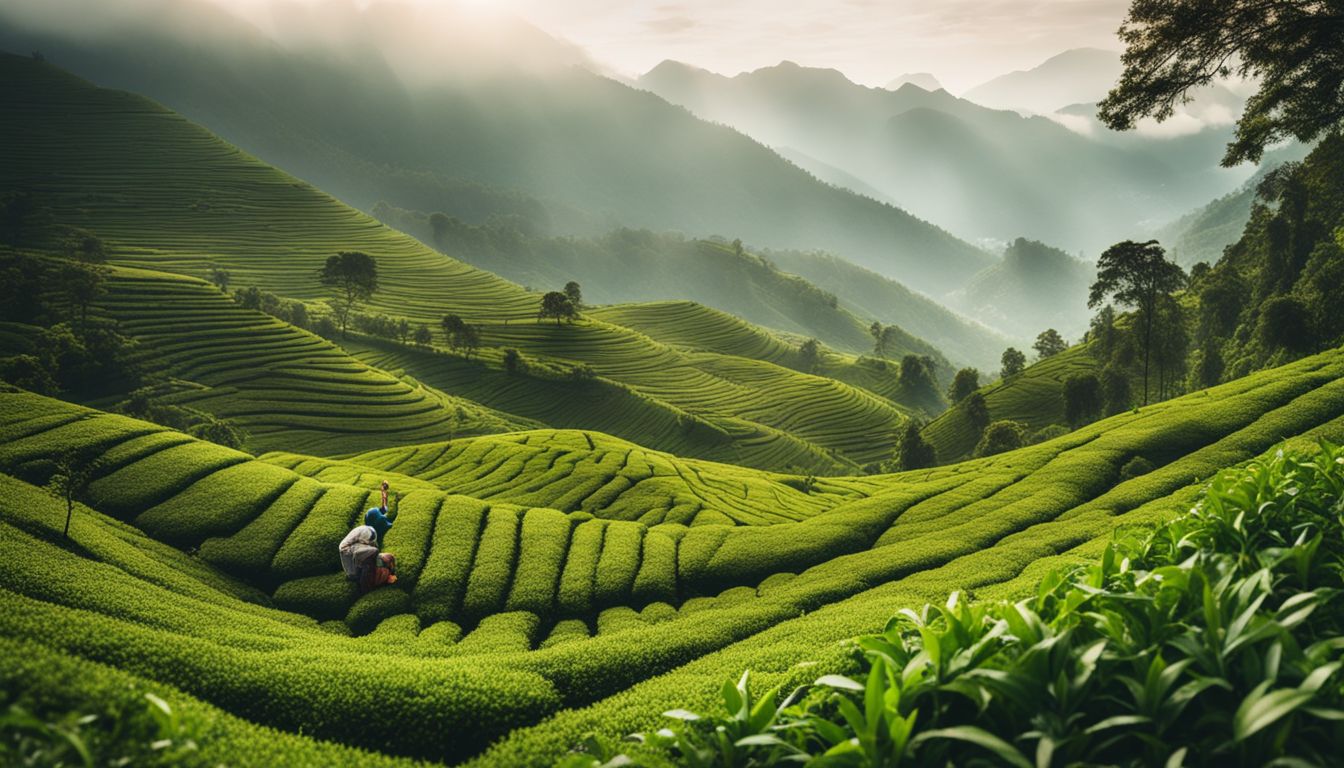
The tea gardens in Sylhet hold immense cultural significance with their traditional tea picking and processing methods, as well as their influence on the local cuisine.
Traditional Tea Picking and Processing Methods
Tea picking in Sylhet’s gardens follows a tradition that dates back many years. Skilled laborers carefully hand-pick the tea leaves to ensure only the best ones are chosen. They are trained to identify which leaves are ready for harvesting, using their expertise and knowledge of the plant.
Once picked, these leaves go through a thorough processing method. The fresh tea leaves are withered, rolled, oxidized, and then dried to create different types of teas such as black, green, or oolong tea.
This traditional approach ensures that every cup of tea brewed from Sylhet’s gardens is packed with flavor and aroma.
The traditional methods used in the processing of tea have been passed down through generations in Sylhet’s gardens. This heritage plays a significant role in maintaining the authenticity and quality of the teas produced here.
Influence on Local Cuisine
Sylhet’s tea gardens have a significant influence on the local cuisine. The tea industry in Bangladesh has a long history, dating back to British rule, and this has had an impact on the culinary traditions of the region.
The socioeconomic conditions of tea garden workers in Sylhet are also being studied, which suggests that their cultural practices and food preferences may shape the local cuisine further.
Additionally, as tea garden ecotourism grows in popularity, it has the potential to contribute to the incorporation of tea-related dishes into the local cuisine. These factors all play a role in shaping and enriching the culinary heritage of Sylhet.
Sustainable Practices in Sylhet Tea Gardens
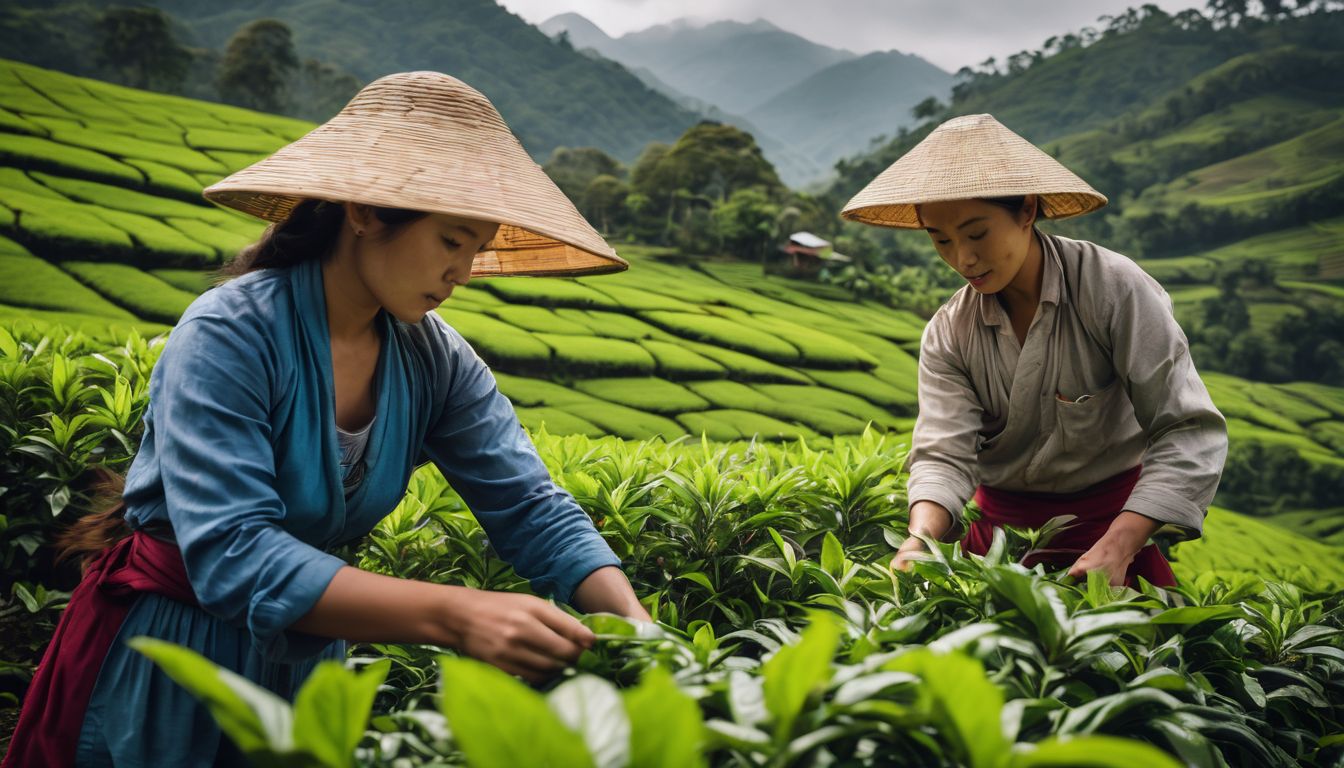
Sylhet Tea Gardens are known for their environmentally friendly farming techniques and fair trade certification.
Environmentally Friendly Farming Techniques
The tea gardens in Sylhet, Bangladesh are implementing environmentally friendly farming techniques. These practices aim to promote sustainability and protect the environment. One important technique is the use of well-drained soils for tea plant growth.
Tea plants are mainly planted along the flanks and sometimes tops of anticlines. By choosing suitable locations for planting, tea garden farmers can ensure optimal growth conditions while minimizing damage to natural resources.
This approach helps in preserving the beauty of Sylhet’s tea gardens while also protecting the ecosystem around them. In addition, these sustainable practices contribute to the overall health and quality of the tea produced in this region.
Fair Trade Certification
The Sylhet Tea Gardens in Bangladesh have achieved Fair Trade Certification, making it the first tea garden in the region to receive this recognition. This certification signifies that the tea produced in these gardens meets international standards for fair and ethical trade practices.
The garden employs sustainable farming techniques to protect the environment while ensuring fair wages and safe working conditions for its workers. By supporting Fair Trade, visitors can enjoy their cup of tea knowing that it has been produced responsibly, benefiting both the workers and the environment.
Additionally, by purchasing tea from Fair Trade certified gardens like Sylhet Tea Gardens, consumers can contribute to sustainable development in rural communities. This certification provides a guarantee that farmers are paid a fair price for their product and have access to resources that improve their livelihoods.
Conclusion
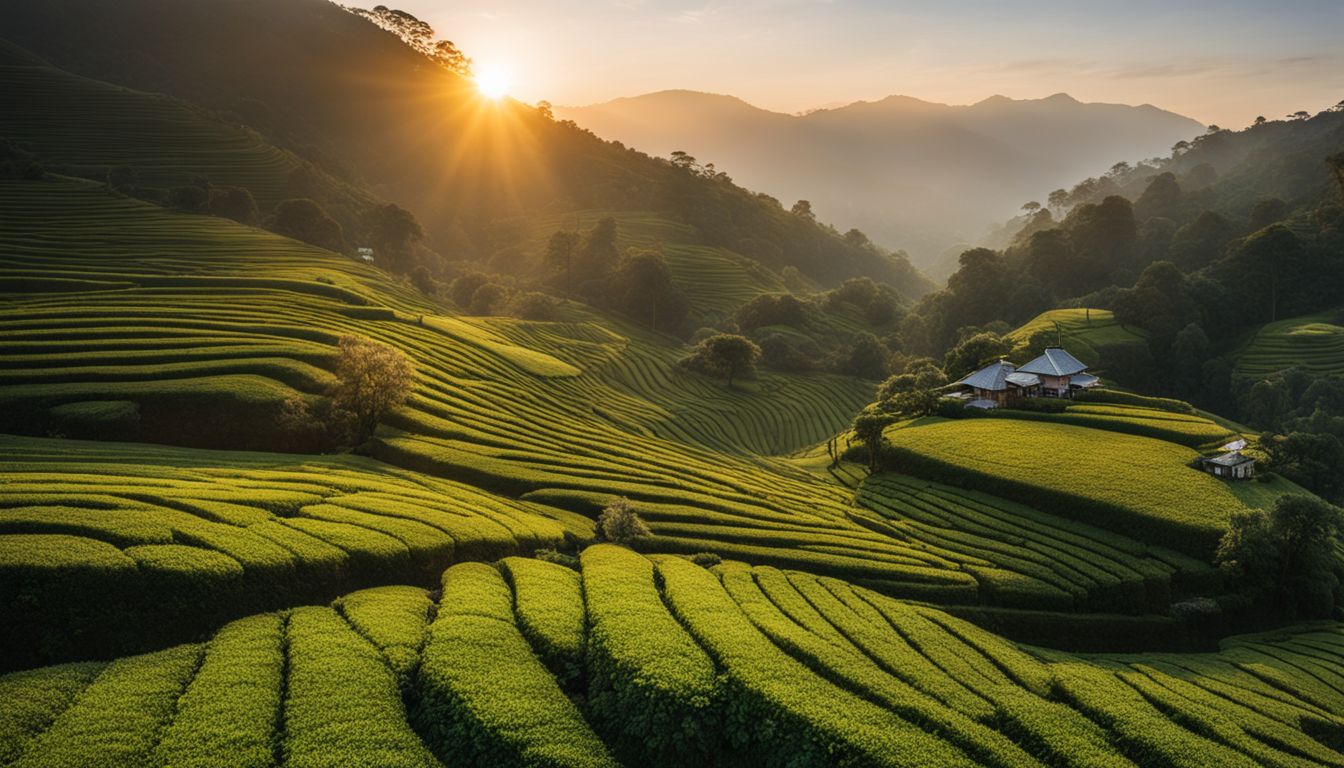
In conclusion, the Sylhet Tea Gardens in Bangladesh offer a mesmerizing experience for nature lovers and photography enthusiasts. With their lush green surroundings, picturesque views, and unique hillside location, these tea gardens truly are a scenic delight.
From learning about the tea making process to sampling different types of teas, there is something for everyone to enjoy. Plan your trip today and immerse yourself in the beauty of Sylhet’s enchanting tea gardens.
FAQs
1. Where are the Sylhet Tea Gardens located?
The Sylhet Tea Gardens are located in Sylhet, a city in Bangladesh.
2. Are the Sylhet Tea Gardens open to visitors?
Yes, the Sylhet Tea Gardens are open to visitors who want to explore and enjoy the scenic beauty of the tea plantations.
3. What can I expect to see at the Sylhet Tea Gardens?
At the Sylhet Tea Gardens, you can expect to see vast stretches of lush green tea plants, rolling hills, and picturesque landscapes that offer a serene and peaceful environment.
4. Can I take a guided tour of the Sylhet Tea Gardens?
Yes, guided tours are available for visitors who wish to learn more about tea cultivation and processing techniques while exploring the gardens.
5. Is there any entry fee for visiting the Sylhet Tea Gardens?
The entry fee may vary depending on whether you choose a guided tour or independent exploration. It’s best to check with local authorities or tour operators for specific details regarding fees.

![Famous tea gardens in Sylhet - [Bangladesh - Episode 11]](https://www.chiamhuiy.com/wp-content/cache/flying-press/J_JyqPZkNh0-hqdefault.jpg)
